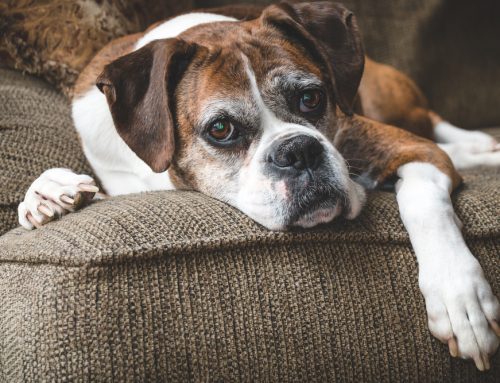There’s no doubt about it—dogs do some weird stuff. But, although what they do may not make sense to us, there is often a reason behind their odd behavior. To help unravel the mysteries of your furry pal’s antics, the Palmer Vet Clinic team has tackled some of the most common weird dog behaviors. Check out the reasons.
Question: Why does my dog sniff other dogs’ tails?
Answer: All species have their personal greeting method, and dogs happen to greet each other with a hind-end sniff. Checking out another dog’s hind end imparts a lot of information, since two small glands located right inside the anus contain pheromone-scented fluid. By sniffing this region, your dog can determine the other dog’s health status, sex, diet, and their mood.
Dogs also prefer to greet the hind end because a direct stare and face-to-face contact is intimidating and threatening in the canine world, and considered poor manners.
Q: Why does my dog kick up their heels after pooping?
A: Perhaps it’s a happy dance because your dog feels lighter after defecating? Or, maybe it’s the equivalent of kicking toilet paper off your shoe before exiting the stall. The most likely reason your dog kicks up grass after pooping is to mark their territory. Your dog is not flinging grass to hide their feces, the way cats kick litter to cover their stool. Instead, they are spreading pheromones from scent glands in their paws. While some scent markers are present in feces and urine, the pheromones in paw scent glands are more pungent and last longer.
Q: Why does my dog love to eat disgusting things?
A: Roadkill served up on the sizzling blacktop, kitty “tootsie rolls” buried in the litter box, and rotten leftovers in the trash are no match for your pooch’s taste buds—or lack thereof. While your dog may simply like the taste of something we consider gross, eating feces can be attributed to a nutritional deficiency. If your pooch commonly eats their own stool, they may need a diet change or diagnostic testing to determine the underlying cause.
Q: Why does my dog eat grass?
A: It’s not unusual for dogs to munch on grass when they are outside. And, if you have lived in the lower 48, you may notice this seems to be more common in Alaska, with dogs eating grass year-round. Perhaps our cooler weather causes grass to grow sweeter, or with a higher moisture content. Whatever the reason for your dog’s increased roughage intake, eating grass will not harm them. Some people theorize that dogs eat grass to make themselves vomit and alleviate a stomach ache, but dogs only vomit occasionally after eating grass. Most likely, your dog first tasted grass out of curiosity or boredom, and continues to eat it because they like how it tastes.
Q: Why does my dog tilt their head?
A: Head tilting is an adorable behavior that has no known reason, but several theories. According to one theory, a dog tilts their head because their muzzle obstructs their vision, so they shift it out of the way to get a better view. Another theory believes that dogs tilt their heads to better pick up interesting noises. No matter the cause, a head tilt should be enjoyed, unless your dog displays a permanent head tilt that requires veterinary attention.
Q: Why does my dog chase their tail?
A: Often seen in puppies, tail chasing can be a fun way to alleviate boredom. Since it’s a cute behavior, dogs often receive more notice when they chase their tails, so the behavior may be reinforced through attention. In some dogs, this can develop into an obsessive compulsive behavior that is difficult to manage. Other cases may be caused by a flea infestation or an anal gland issue that makes your dog need to chase their tail, or to lick, chew, and bite that area.
Q: Why does my neutered dog hump everything in sight?

A: While intact dogs are known to hump other dogs for reproductive purposes, neutered and spayed dogs can also perform this act. In sterilized dogs, humping is often a sign of overarousal and excitement, where your pet does not know how to react. For example, humping is often seen at dog parks when intense action leads to overexcitement. Dogs can also hump an object or person as a displacement behavior when they are unsure how to behave. Humping is rarely attributed to dominance, although that may play a part in determining your dog’s place in the pecking order.
Here at Palmer Vet Clinic, we’re glad we know your pet almost as well as you do. A lifelong relationship with your furry pal allows us to determine if your dog is simply weird when they perform odd behaviors, or they have an underlying medical issue. If you’re worried about your pooch’s behavior, give us a call to schedule an appointment.








Leave A Comment